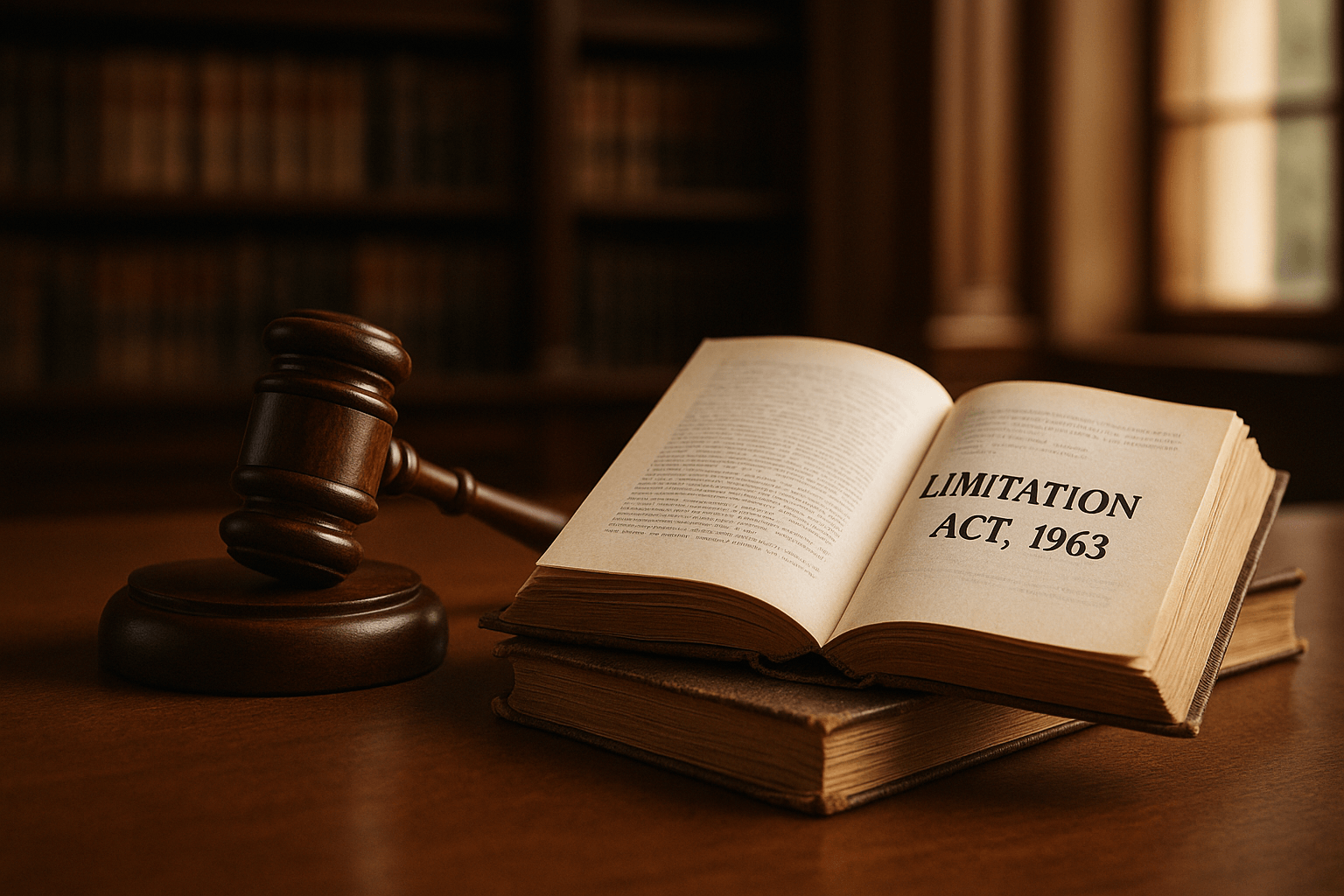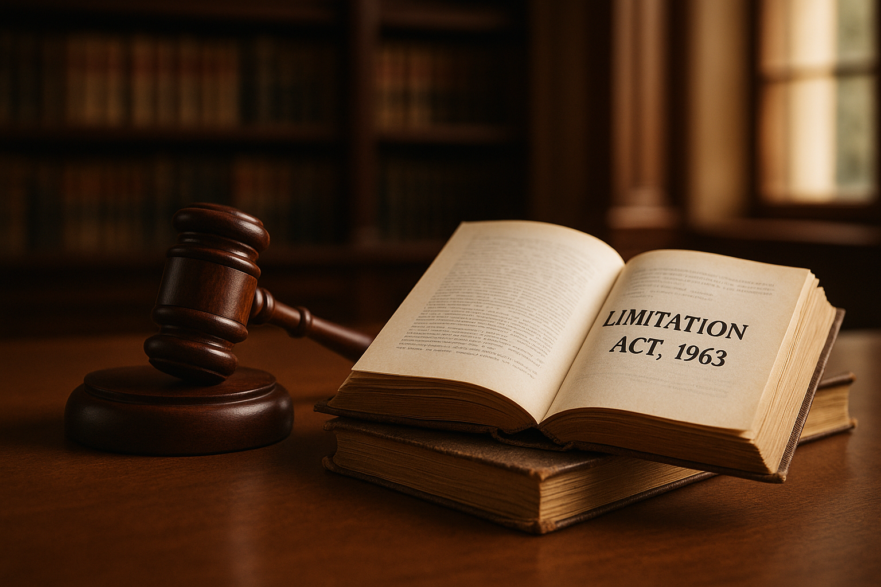
📘 EFFECT OF ACKNOWLEDGEMENT IN WRITING
- Effect of acknowledgement in writing, section 18 Limitation Act
- Substituting or adding new plaintiff or defendant, section 21 Limitation Act
- Supreme Court in Karuppaswamy v. C. Ramamurthy [1993]
The acknowledgement as prescribed by Section 18 Limitation Act is a mere acknowledgement of the liability in respect of the right in question. It need not be accompanied by a promise to pay
⚖️ Supreme Court on section 21 Limitation Act
- The effect of the proviso to section 21 is not to begin from the date on which application was made or from the date of permission but from the date of the suit.
- The proviso is in line with the spirit and thought of some other provisions in Part III of the Act such as Section 14 and Section 17(1).
Preparation for RJS, DJS, PCS (J) and other Judicial Service exams
LIMITATION ACT EXPLAINED — SECTION 18, 21
The Limitation Act is an important component of any and every Judicial Service exam in the country. Its thorough knowledge is a must for all aspirants of RJS, DJS, PCS (J) and every other Judicial Service exam. To help such aspirants, DELHI LAW ACADEMY JAIPUR has launched a series of study material modules on all important aspects of this important part of their syllabus:
🧾 Effect of acknowledgement in writing — Section 18(1)
- Where
- before expiration of the prescribed period for a suit or application
- in respect of a property or right
- an acknowledgement of liability in respect of such property or right has been made in writing
- signed by the party against whom such property or right is claimed
- a fresh period of limitation shall be computed from the time when the acknowledgement was so signed
📜 Section 18(2)
- Where the writing containing the acknowledgement is undated
- oral evidence may be given of the time when it was signed
- but oral evidence of its contents shall not be received
💡 Explanation (a)
- An acknowledgement may be sufficient though it
- omits to specify exact nature of the property or right
- avers that time for payment, delivery or performance has not yet come
- is accompanied by a refusal to pay, deliver or perform
- is coupled with a claim to set-off
- is addressed to a person other than a person entitled to the property or right
- “signed” means signed either personally or by an agent duly authorised
- An application for execution of a decree or order shall not be deemed to be an application in respect of any property or right
- Essential ingredients of section 18:
- There is an admission or acknowledgment
- Such acknowledgment is in respect of a liability in respect of a property or right
- It is made before expiry of the prescribed period
- It is in writing and is signed by the party against whom such property or right is claimed
Question:
Should the acknowledgement be accompanied by a promise to pay?
Ans:
For treating a writing signed by the party as an acknowledgement, the person acknowledging must be conscious of his liability and the commitment should be made towards that liability. The acknowledgement as prescribed by Section 18 is a mere acknowledgement of the liability in respect of the right in question. It need not be accompanied by a promise to pay either expressly or by implication.
🔍 The twin requirement
- If
- words used in the acknowledgement indicate existence of jural relationship between the parties, such as that of debtor or creditor, and…
- the statement was made with the express intention to admit such jural relationship or if such intention could be inferred by implication from the nature of the admission
- the acknowledgement of liability would follow
The statement on which a plea of acknowledgement was based must relate to a present subsisting liability though the exact nature or the specific character of the said liability might not be indicated in words.
Where a statement setting out jural relationship is made clearly without intending to admit its existence, an intention to admit cannot be imposed on its maker by an involved or a far-fetched process of reasoning.
⚖️ Section 21(1) — Substituting or adding new plaintiff or defendant
- Where a new plaintiff or defendant is substituted or added after institution of a suit, the suit shall be deemed, as regards him, to have been instituted when he was so made a party
🟡 Proviso
- Where court is satisfied that omission to include a new plaintiff or defendant was due to a mistake made in good faith, it may direct that the suit shall be deemed to have been instituted on an earlier date as regards such plaintiff or defendant
📜 Section 21(2)
- sub-section (1) shall not apply where a party is added or substituted owing to assignment or devolution of interest during pendency of a suit
- Objective of the proviso
- The proviso has appeared to permit correction of errors which have been committed due to a mistake made in good faith, but only when the court so permits.
- In that event, its effect is not to begin from the date on which application was made or from the date of permission but from the date of the suit, deeming it to have been correctly instituted on an earlier date than the date of making the application.
- The proviso is in line with the spirit and thought of some other provisions in Part III of the Act such as Section 14 and Section 17(1).
- Requirements of the proviso
- While invoking the beneficent proviso to section 21(1):
- an averment that a mistake was made in good faith by impleading a dead defendant in the suit should be made and
- and the court must on proof be satisfied that the motion to include the right defendant by substitution or addition was just and proper, the mistake having occurred in good faith.
- The court’s satisfaction alone breathes life in the suit.
Authority: Karuppaswamy v. C. Ramamurthy [1993 SC]
📚 Continue Your Limitation Act Preparation
Don’t stop here! Strengthen your knowledge of the Limitation Act with our other fully solved tests:
📘 Free Study Material for Judiciary Aspirants!
Download our FREE study material prepared by Delhi Law Academy’s expert faculty.
An acknowledgement must be made in writing, signed by the party against whom the right is claimed, and must indicate a conscious admission of a subsisting liability. It need not include an express promise to pay. The acknowledgment must be made before the expiry of the limitation period.
❌ No, Section 18 does not require any promise to pay. The acknowledgement is only a recognition of the existing liability in respect of the right in question. A mere written admission of liability, even if coupled with a refusal or set-off, is sufficient to extend the limitation period.
When a valid acknowledgement is made, a fresh period of limitation starts from the date the acknowledgement was signed. If the document is undated, oral evidence may be given to prove when it was signed, though not of its contents.
When a new plaintiff or defendant is added after the institution of the suit, the suit is deemed to have been instituted against them on the date they were added. However, the Court may deem it instituted from an earlier date if it is satisfied that the omission was due to a mistake made in good faith.
The proviso allows the Court to correct genuine mistakes where a party was left out due to good faith error. In such cases, the suit is treated as if it had been properly filed from the original date, maintaining fairness and continuity with the spirit of Sections 14 and 17 of the Act.
The Supreme Court held that the effect of the proviso to Section 21 is not from the date of the application or permission but from the date of the suit itself. The Court reaffirmed that the proviso aligns with the equitable principles behind Sections 14 and 17 of the Limitation Act.
Contact us
📍 Delhi Law Academy – Jaipur Branch
6C, Tower 2, Coaching Hub, Pratap Nagar, Jaipur – 302033
📞 Phone:
+91 9911916552
+91 8447285606
✉️ Email:
contactus@delhilawacademy.com

